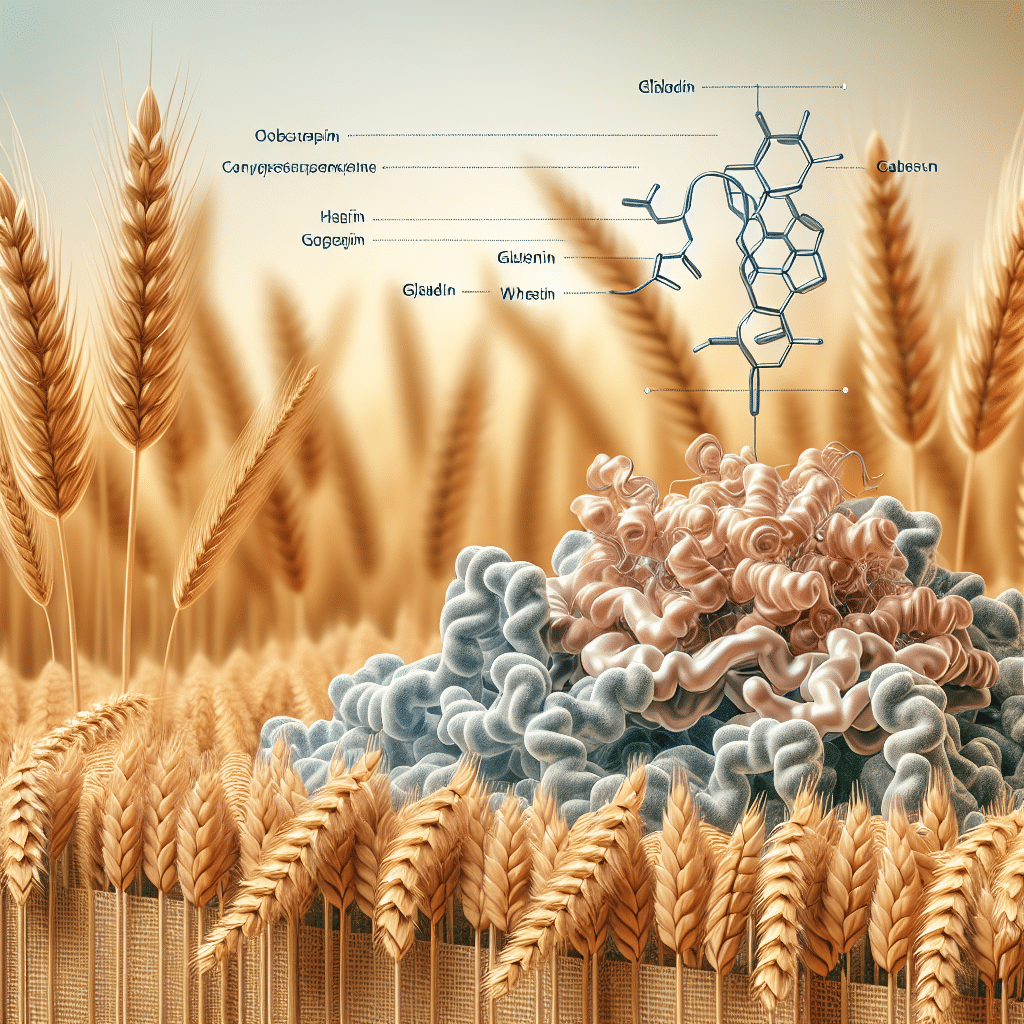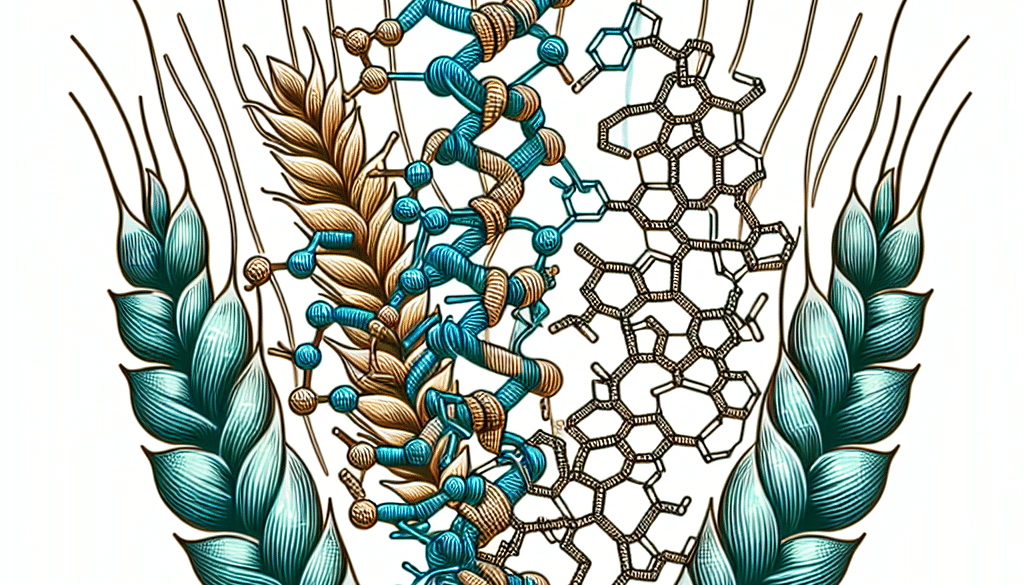What Are The Two Main Proteins In Wheat?
-
Table of Contents
- Understanding the Two Main Proteins in Wheat: Glutenin and Gliadin
- The Role of Glutenin and Gliadin in Wheat
- Glutenin: The Strength Behind Wheat’s Elasticity
- Gliadin: The Protein That Provides Extensibility
- Health Implications of Wheat Proteins
- Celiac Disease and Gluten Sensitivity
- Wheat Allergy and Its Effects
- Gluten-Free Alternatives and Innovations
- Emerging Gluten-Free Ingredients
- Technological Advances in Gluten-Free Baking
- Conclusion: The Significance of Wheat Proteins
- Discover ETprotein’s High-Quality Protein Products
Understanding the Two Main Proteins in Wheat: Glutenin and Gliadin

Wheat is one of the most widely consumed grains in the world, serving as a staple food for a significant portion of the global population. It is not only a source of carbohydrates but also provides essential proteins that are vital for human nutrition. Among these proteins, glutenin and gliadin stand out as the two main components that give wheat its unique properties, especially in the context of baking and dough formation. In this article, we will delve into the characteristics, functions, and implications of these two proteins in wheat.
The Role of Glutenin and Gliadin in Wheat
Wheat proteins can be classified into several groups based on their solubility in water and salt solutions. Glutenin and gliadin are both part of the gluten protein complex, which is responsible for the elasticity and extensibility of wheat dough. Understanding these proteins is crucial for both the food industry and consumers, especially those with gluten-related disorders.
Glutenin: The Strength Behind Wheat’s Elasticity
Glutenin is a protein that contributes to the strength and elasticity of wheat dough. It is a polymer, meaning it consists of multiple subunits linked together, which gives it the ability to form a network within the dough. This network is what allows the dough to stretch and hold its shape, making it essential for the structure of baked goods like bread and pastries.
Gliadin: The Protein That Provides Extensibility
Gliadin, on the other hand, is responsible for the extensibility and viscosity of wheat dough. It is a monomeric protein that interacts with glutenin to form gluten. Gliadin’s unique properties allow the dough to expand and rise during the baking process, contributing to the soft and fluffy texture of the final product.
Health Implications of Wheat Proteins
While glutenin and gliadin are invaluable for baking, they can also pose health challenges for individuals with gluten-related disorders, such as celiac disease and wheat allergies. These conditions trigger an immune response when gluten is consumed, leading to various symptoms and potential damage to the digestive system.
Celiac Disease and Gluten Sensitivity
Celiac disease is an autoimmune disorder where the ingestion of gluten leads to damage in the small intestine. Gliadin is particularly problematic in this context, as it contains sequences of amino acids that are recognized by the immune system of individuals with celiac disease, triggering an inflammatory response.
Wheat Allergy and Its Effects
Wheat allergy is another condition where the body’s immune system reacts to proteins found in wheat, including glutenin and gliadin. Unlike celiac disease, a wheat allergy can cause immediate allergic reactions, ranging from mild to potentially life-threatening.
Gluten-Free Alternatives and Innovations
With the rise of gluten-related health issues, there has been a growing demand for gluten-free alternatives. The food industry has responded by developing a variety of wheat-free products that mimic the properties of gluten using alternative protein sources.
Emerging Gluten-Free Ingredients
Ingredients such as rice protein, pea protein, and other plant-based proteins have become popular substitutes in gluten-free formulations. These proteins are designed to replicate the texture and structure that gluten provides in traditional wheat-based products.
Technological Advances in Gluten-Free Baking
Food scientists are continually exploring new methods and ingredients to improve the quality of gluten-free baked goods. Innovations in processing and formulation have led to gluten-free products that are closer in taste and texture to their wheat-based counterparts.
Conclusion: The Significance of Wheat Proteins
In summary, glutenin and gliadin are the two main proteins in wheat that play a critical role in the texture and structure of wheat-based products. While they are essential for the baking industry, they also present challenges for individuals with gluten-related disorders. The development of gluten-free alternatives and technological advancements in food science offer promising solutions for those who must avoid gluten while still enjoying similar food experiences.
Discover ETprotein’s High-Quality Protein Products
If you’re looking for gluten-free protein alternatives, ETprotein offers a range of organic bulk vegan proteins that cater to various dietary needs. Their products, including organic rice protein, pea protein, and other plant-based proteins, are characterized by a neutral taste and are non-GMO and allergen-free. With a commitment to quality and purity, ETprotein’s offerings are suitable for a wide array of industries, from nutraceuticals to food and beverage.
About ETprotein:
ETprotein, a reputable protein and L-(+)-Ergothioneine (EGT) Chinese factory manufacturer and supplier, is renowned for producing, stocking, exporting, and delivering the highest quality organic bulk vegan proteins and L-(+)-Ergothioneine. They include Organic rice protein, clear rice protein, pea protein, clear pea protein, watermelon seed protein, pumpkin seed protein, sunflower seed protein, mung bean protein, peanut protein, and L-(+)-Ergothioneine EGT Pharmaceutical grade, L-(+)-Ergothioneine EGT food grade, L-(+)-Ergothioneine EGT cosmetic grade, L-(+)-Ergothioneine EGT reference grade and L-(+)-Ergothioneine EGT standard. Their offerings, characterized by a neutral taste, non-GMO, allergen-free attributes, with L-(+)-Ergothioneine purity over 98%, 99%, cater to a diverse range of industries. They serve nutraceutical, pharmaceutical, cosmeceutical, veterinary, as well as food and beverage finished product distributors, traders, and manufacturers across Europe, USA, Canada, Australia, Thailand, Japan, Korea, Brazil, and Chile, among others.
ETprotein specialization includes exporting and delivering tailor-made protein powder and finished nutritional supplements. Their extensive product range covers sectors like Food and Beverage, Sports Nutrition, Weight Management, Dietary Supplements, Health and Wellness Products, and Infant Formula, ensuring comprehensive solutions to meet all your protein needs.
As a trusted company by leading global food and beverage brands and Fortune 500 companies, ETprotein reinforces China’s reputation in the global arena. For more information or to sample their products, please contact them and email sales(at)ETprotein.com today.














